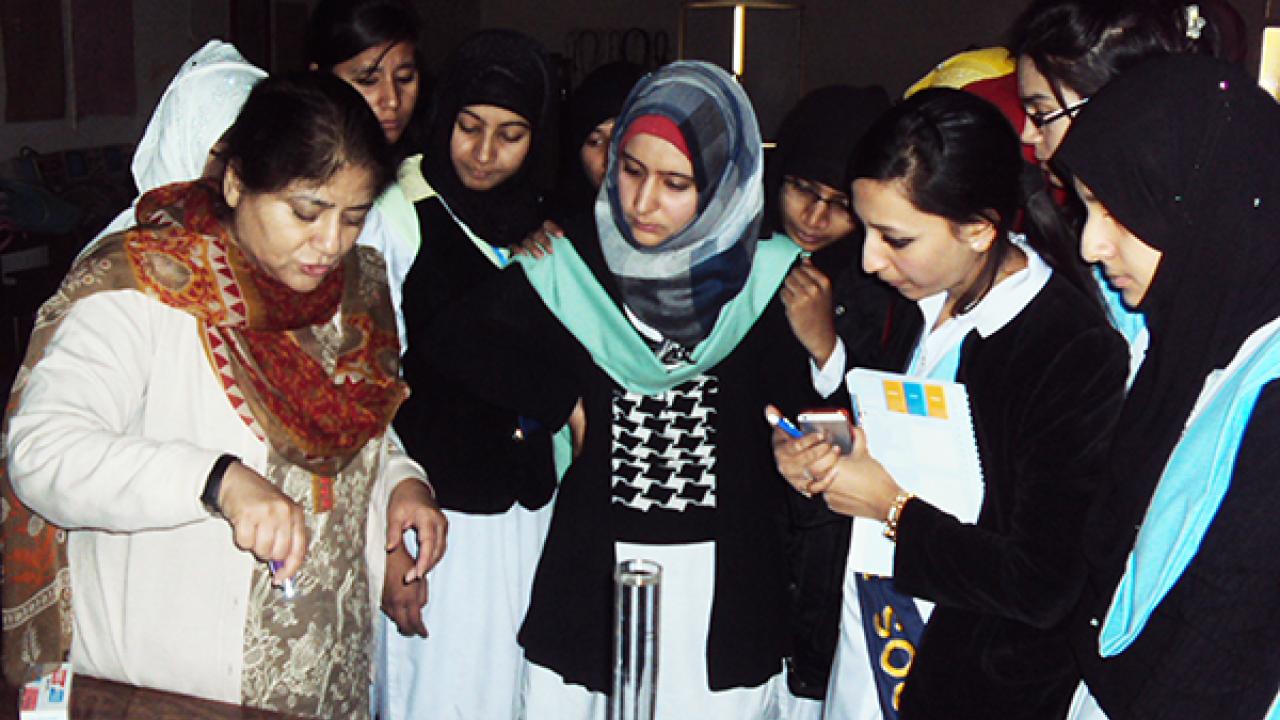
ICTP is pleased to share news about four associates, who recently achieved important professional success.
Professor Imrana Ashraf Zahid, ICTP Senior Associate, was recently awarded the OPTICA (Former Optical Society Of America) Diversity & Inclusion Advocacy Recognition "for her tireless work to promote optics and photonics careers in emerging economy nations, with a special emphasis on women, the transgender community and rural areas."
An Affiliate and retired Associate Professor of Physics at Quaid-i-Azam University in Islamabad, Pakistan, she is closely familiar with ICTP and its networks.
In addition to being the first woman in Pakistan to earn a PhD in quantum optics, in 2004 she became one of the first women to win the ICO/ICTP Prize for her significant scientific contributions to optics and photonics. She has been a regular tutor at the annual ICTP Winter College on Optics, providing, at her own initiative, after-hours tutorials to any participants who found themselves struggling to follow the material presented in lectures. In Pakistan, she has promoted the education of young women by organizing hands-on, scientific activities.
Known as an energetic scientist and mentor, last year Ashraf came up with the idea for and drove the launch of the Pak-ICTP Alumni Society (PIAS), which "aims to establish a vibrant ICTP alumni network to nurture research collaborations, organize scientific outreach activities, provide career and vocational mentorship and help to develop active academic linkages between Pakistani and Italian educational institutes."
Professor John Fredy Barrera Ramírez, ICTP Regular Associate, was elected Corresponding Member of the Colombian Academy of Exact, Physical and Natural Sciences. According to the statutes of the Academy: “National or foreign scientists, residents in Colombia or abroad, of exceptional merits, who have contributed to the scientific development of the country, may be corresponding members”.
Professor Barrera Ramírez was awarded the ICO/ICTP Gallieno Denardo Award in 2014 "for his breakthrough contributions to the field of Optical Encryption and its potential applications, as well as his promotion of research and training in optics in Colombia, and dedication to public outreach" He was an ICTP Junior Associate from 2012 to 2017.
M.M. Sheikh-Jabbari, ICTP senior associate, wrote a graduate textbook on black hole physics that has been recently published by Springer. A good part of this book was written during his sabbatical year spent at ICTP (in 2019-2020). Currently at the Institute For Research In Fundamental Sciences, Iran, Sheikh-Jabbari is a long term associate/visitor of ICTP since 1999 when he was a postdoc there. He has also received the ICTP prize 2007 "for his important contributions to non-commutative field theories in the context of D-branes and superstring theories, leading to interesting formal and phenomenological developments in theoretical and mathematical physics."
Prof. Abdelmoneim A. Sulieman, ICTP Senior Associate, was recently listed in the Stanford-Elsevier top 2% scientist for the year 2022.
Sulieman is a professor at the Radiology and Medical Imaging Department, Prince Sattam bin Abdulaziz University, Saudi Arabia. He visited Trieste through the Associateship Scheme, which enabled him to establish a scientific collaboration with Elettra, INFN, and a local hospital. "I have to thank ICTP for the opportunity to carry out some of my research and write my papers in this wonderful place," said Sulieman.
-------
The Associateship Scheme, one of ICTP's oldest programmes, provides support for active scientists from developing countries to maintain long-term, formal contact with the Centre.
The programme supports the visits of scientists to ICTP, exposing them to the most modern aspects of their scientific fields. In return, the Associates are expected to play a major role in building their scientific communities, enhancing physics and mathematics education at all levels, and planning research projects related to the specific needs of their home regions.
















